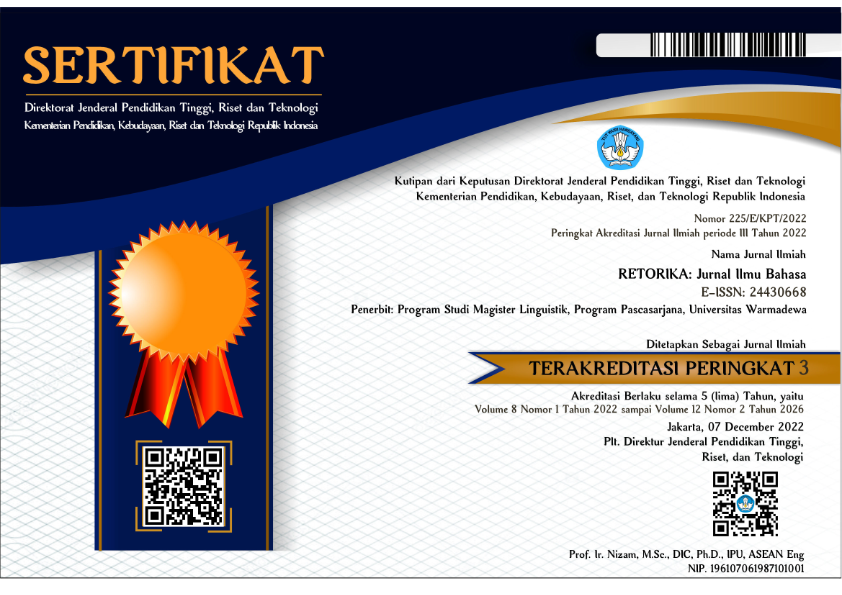The Role of Social Media Toward EFL Students’ Writing Skills
Abstract
The landscape of higher education in Indonesia underscores the significance of English proficiency for academic advancement. Traditionally, English as a Foreign Language (EFL) instruction heavily relied on face-to-face classroom interactions guided by lecturers. However, the emergence of information technology has revolutionized learning paradigms, offering EFL students diverse opportunities beyond conventional classroom boundaries. This study investigates the pivotal role of social media platforms in enhancing the writing skills of EFL students. Utilizing a descriptive research design, data were collected from 54 participants enrolled in English III classes in 2021, focusing on English writing. Quantitative data and specific examples were gathered through questionnaires and interviews. The findings revealed a resoundingly positive response from students regarding the efficacy of social media in improving their writing skills. Furthermore, the study elucidated various benefits derived from social media use, including enhanced writing proficiency, expanded English vocabulary, and overall effectiveness as a supplementary learning tool. Thus, it is evident that social media harbors immense potential as a complementary platform for bolstering English writing skills, particularly for EFL students, offering a modern approach to language education.
References
Boas, I. V. (2011). Process Writing and the Internet: Blogs and Ning Networks in the Classroom. English Teaching Forum, 49(2), 26-33.
Boyd, D. M., & Ellison, N. B. (2007). Social Network Sites: Definition, History, and Scholarship. Journal of ComputerMediated Communication, 13,210-230.
Brown, H. D. (2007). Teaching by Principles: An Interactive Approach to Language Pedagogy. (2nd ed.). New York: Longman
Chou, C. M. (2014). Social media characteristics, customer relationship, and brand equity. The Journal of Applied Business and Economics, 16(1), 128–145.
Connolly, M. (2011). Does Social Networking Enhance or Impede Student Learning? Social Networking and Student Learning: Friends without Benefits. Retrieved from https://contestedissues.wordpress.com/table-ofcontents/chapter-7-does-social-networking-enhance-orimpede-student-learning/
Gettman, H. J., & Cortijo, V. (2015). “Leave me and my Facebook alone!†Understanding college students’ relationship with Facebook and its use for academic purposes. International Journal for the Scholarship of Teaching and Learning, 9(1), 8.
Gonye J, Mareva R, Dudu WT, Sibanda J (2012). Academic writing challenges at Universities in Zimbabwe : A case study of great Zimbabwe University. J. English Lit. 3(3):71-83.
Hagemann, J. A. (2003). Teaching grammar: A reader and workbook. Boston, MA: Allyn and Bacon.
Kaplan, A.M. and Haenlein, M. (2010) Users of the World, Unite! The Challenges and Opportunities of Social Media. Business Horizons, 53, 59-68.
http://dx.doi.org/10.1016/j.bushor.2009.09.003
Kiuhara, S. A., Graham, S., & Hawken, L. S. (2009). Teaching writingtohighschool students: A national survey. Journal of Educational Psychology, 101(1), 136–160. https://doi.org/10.1037/a0013097
Lakhal, M. (2022). The Role of social media in Developing English Language Writing Skills: Moulay Ismail University as a Case Study. International Journal of English Literature and Social Sciences, 7(3), 267–276. https://doi.org/10.22161/ijels.73.41
Liu, Y. (2010). Social media tools as a learning resource. Journal of Educational Technology Development and Exchange (JETDE), 3(1), 8–22.
Monica, & Anamaria, P. (2014). The Impact of Social Media on Vocabulary Learning Case Study-Facebook. Annals of the University of Oradea, Economic Science Series, 23(2).
Pennington, M. (2004). Electronic media in second language writing: An overview of tools and research findings. New perspectives on CALL for second language classrooms (pp. 69-92).
Roblyer, M., McDaniel, M., Webb, M., Herman, J., & Witty, J. V. (2010). Findings on Facebook in higher education: A comparison of college faculty and student uses and perceptions of social networking sites. The Internet and Higher Education, 13(3), 134-140. http://dx.doi.org/10.1016/j.iheduc.2010.03.002
Sakkir, G., Rahman, Q., & Salija, K. (2016). Students’ Perception on Social Media in Writing Class at STKIP Muhammadiyah Rappang, Indonesia. International Journal of English Linguistics, 6(3), 170. https://doi.org/10.5539/ijel.v6n3p170
Sari, Meutia Puspita. 2017. Fenomena Penggunaan Media Sosial InstagramSebagai Komunikasi Pembelajaran Agama Islam oleh Mahasiswa FISIPUniversitas Riau. Jurnal Online Mahasiswa (JOM) FISIP. Vol. 4 No. 2Oktober 2017.
Voss, R, F and Keene M, L. 1992.The Heath Guide to Collage Writing.D.C. Heath and Company.
Yunus, M. M., & Salehi, H. (2012). The effectiveness of Facebook groups on Teaching and Improving Writing: Students’ perceptions. Journal of Education and Information Technologies, 1(6), 87-96.
Zam Zam Al Arif, T. (2019). the Use of Social Media for English Language Learning: an Exploratory Study of Efl University Students. Metathesis: Journal of English Language, Literature, and Teaching, 3(2), 224–233. https://doi.org/10.31002/metathesis.v3i2.1921
Copyright (c) 2024 RETORIKA: Jurnal Ilmu Bahasa

This work is licensed under a Creative Commons Attribution-ShareAlike 4.0 International License.
This journal provides immediate open access to its content on the principle that making research freely available to the public supports a greater global exchange of knowledge.
All articles published Open Access will be immediately and permanently free for everyone to read and download. We are continuously working with our author communities to select the best choice of license options, currently being defined for this journal as follows: Creative Commons-Non Ceomercial-Attribution-ShareAlike (CC BY-NC-SA)
 Abstract viewed = 57 times
Abstract viewed = 57 times
 PDF downloaded = 78 times
PDF downloaded = 78 times

2.png)














